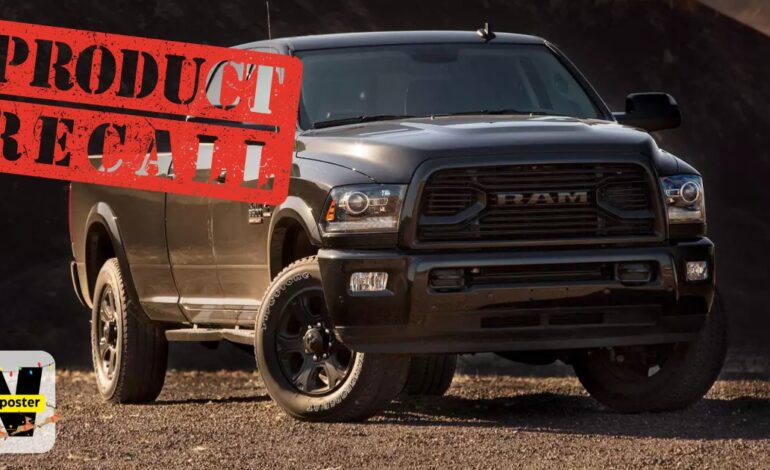
Stellantis Recalls Over 317,000 Ram Trucks Due to Faulty Anti-lock Braking Systems (ABS), Addressing Safety Concerns in 2017-2018 Models
Stellantis Recalls Over 317,000 Ram Trucks Due to Faulty Anti-lock Braking Systems (ABS), Addressing Safety Concerns in 2017-2018 Models
Introduction:
Stellantis, one of the world’s leading automobile manufacturers, has issued a significant recall of more than 317,000 Ram pickup trucks following safety concerns regarding faulty hydraulic control units in certain 2017-2018 models. This issue, which affects the Ram 2500, 3500, 4500, and 5500 models, compromises the vehicle’s anti-lock braking system (ABS), electronic stability control (ESC), and traction control systems, presenting an increased risk of accidents. While the issue does not affect standard braking functions, the failure of critical safety systems in emergency or high-risk driving conditions could lead to catastrophic outcomes.
This recall is part of a broader series of operational and safety challenges faced by Stellantis, following other high-profile recalls and financial setbacks. This article explores the scope of the recall, its implications for vehicle safety, the timeline for corrective measures, and the broader context of Stellantis’ struggles in the competitive automotive industry.
The Scope of the Recall
The recall, which has been officially announced by Stellantis and reported by the National Highway Traffic Safety Administration (NHTSA), affects Ram trucks from the 2017 and 2018 model years. Specifically, the affected models include:
- Ram 2500
- Ram 3500
- Ram 4500
- Ram 5500
These trucks, particularly popular among owners who rely on them for heavy-duty tasks like construction and towing, have been identified as having a critical defect in their hydraulic control units. These units are responsible for managing the functionality of the ABS, ESC, and traction control systems—key components designed to ensure driver safety in adverse road conditions.
According to the NHTSA report, the hydraulic control units in the affected trucks may fail unexpectedly. If this happens, the ABS, ESC, and traction control systems may cease to function properly, leaving the vehicle vulnerable in emergency braking situations.
Though the failure of these systems does not impact the vehicle’s ability to brake normally under regular conditions, the loss of these safety systems in emergency scenarios, such as during sudden evasive maneuvers or on slippery roads, heightens the risk of an accident. The recall affects 317,000 vehicles in the U.S. alone, with additional vehicles in Canada and other international markets also impacted.
Potential Safety Risks
The safety concerns surrounding the faulty hydraulic control units are significant. Anti-lock braking systems (ABS) are designed to prevent the wheels from locking up during hard braking, allowing drivers to maintain steering control. Electronic stability control (ESC) helps to maintain vehicle stability by detecting and reducing skidding, while traction control assists with traction on slippery surfaces, preventing wheel spin.
These systems, when functioning properly, can be lifesaving—particularly in situations involving poor road conditions or high-speed driving. A failure in any of these systems could lead to loss of vehicle control, which could result in severe accidents, including rollovers, collisions, or crashes into obstacles.
For drivers of heavy-duty trucks, such as the Ram 2500, 3500, 4500, and 5500 models, the need for reliable safety features is even more critical. These vehicles are often used for towing heavy loads, which can exacerbate braking difficulties and increase the risk of accidents. The absence of fully operational ABS and ESC systems could significantly reduce the vehicle’s handling capabilities, making it harder for the driver to avoid accidents in emergency situations.
While Stellantis has emphasized that standard braking functions remain operational, the loss of these advanced safety systems remains a serious concern. In particular, the risk is amplified when these trucks are operated in adverse weather conditions—such as rain, snow, or icy roads—or when navigating mountainous or winding roads, where sudden braking and the ability to maintain control is especially crucial.
Timeline and Remedy for Affected Owners
The recall notification process will begin in early January 2024. Affected owners will receive formal letters outlining the scope of the recall and instructions on how to proceed. Stellantis has committed to addressing the issue by repairing or replacing the faulty hydraulic control units at no cost to the owners. The company has indicated that dealerships will provide free repairs to ensure the safety of the affected trucks.
Owners of the affected vehicles are urged to contact their local Ram dealerships for further instructions once they receive the recall notice. Stellantis has also established a dedicated support line for affected customers to answer any questions related to the recall or repair process.
Broader Impact on Stellantis and the Automotive Industry
The recall of 317,000 Ram trucks is just one of several safety and operational challenges facing Stellantis. In recent months, the automaker has been involved in multiple recalls for different vehicle models. Just last month, the company recalled 207,000 Jeep and Dodge SUVs in the U.S. due to a computer issue that could disable ABS and ESC features.
Moreover, a global recall in September 2023 affected nearly 1.5 million Ram pickups, once again due to software problems that compromised the ESC system. This series of recalls highlights ongoing concerns regarding the quality control processes within Stellantis and raises questions about the company’s ability to meet the increasing demand for safe, reliable vehicles.
The recall also comes at a challenging time for Stellantis financially. The company is grappling with a 27% drop in net revenue, largely due to rising production costs and a slowdown in vehicle sales. Additionally, Stellantis faces inventory challenges, with a significant buildup of unsold vehicles on dealership lots. To address these financial pressures, Stellantis has been forced to implement layoffs and make other cost-cutting measures.
In the highly competitive automotive industry, recalls and safety issues can severely damage a company’s reputation and market share. While Stellantis has taken steps to address the issues in the affected vehicles, the company will likely face increased scrutiny from both consumers and regulatory agencies in the coming months.
Legal Implications and Consumer Impact
For vehicle owners, the recall presents an inconvenience and potential safety risk. Drivers of the affected vehicles will have to schedule repairs, which could impact their ability to use their trucks for work or other purposes. Furthermore, the legal implications for Stellantis could be significant if any accidents occur as a result of the faulty systems, particularly if the company fails to address the issue in a timely manner.
The National Highway Traffic Safety Administration (NHTSA) and other regulatory bodies will continue to monitor the situation closely. If any accidents related to the faulty ABS systems occur, Stellantis could face legal action from affected consumers or class action lawsuits, which could lead to significant financial penalties.
Conclusion: A Critical Issue for Stellantis and Its Consumers
The recall of over 317,000 Ram trucks represents a major challenge for Stellantis as the company grapples with safety concerns, financial difficulties, and ongoing operational hurdles. The affected vehicles, while not immediately dangerous in terms of basic braking functions, present a significant safety risk due to the failure of critical systems that aid in vehicle control during emergency situations. As Stellantis moves forward with the recall, it will be crucial for the company to restore consumer confidence and ensure the safety of its vehicles.
For vehicle owners, it is essential to stay informed about the recall process and take the necessary steps to address the faulty hydraulic control units. While the repairs will be free of charge, the inconvenience and potential safety risks make it vital that affected owners act swiftly to ensure their trucks are repaired and fully operational.
The recall underscores the importance of quality control and regulatory oversight in the automotive industry. As the recall process unfolds, Stellantis must work to resolve the current issues while taking steps to prevent similar problems in the future, in order to regain the trust of consumers and regulators alike.



